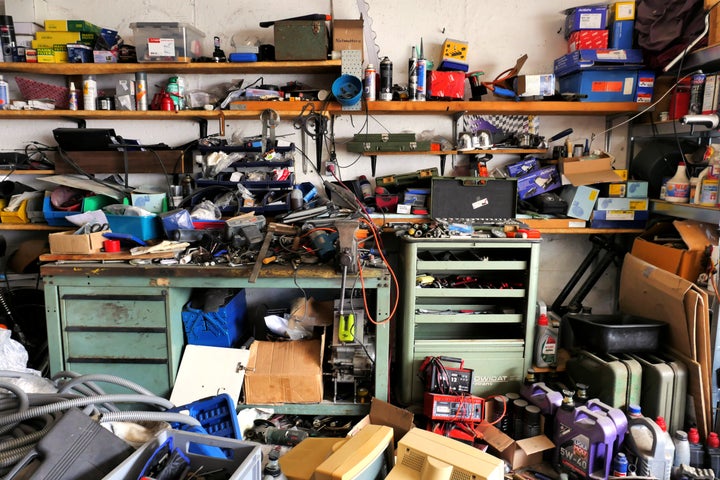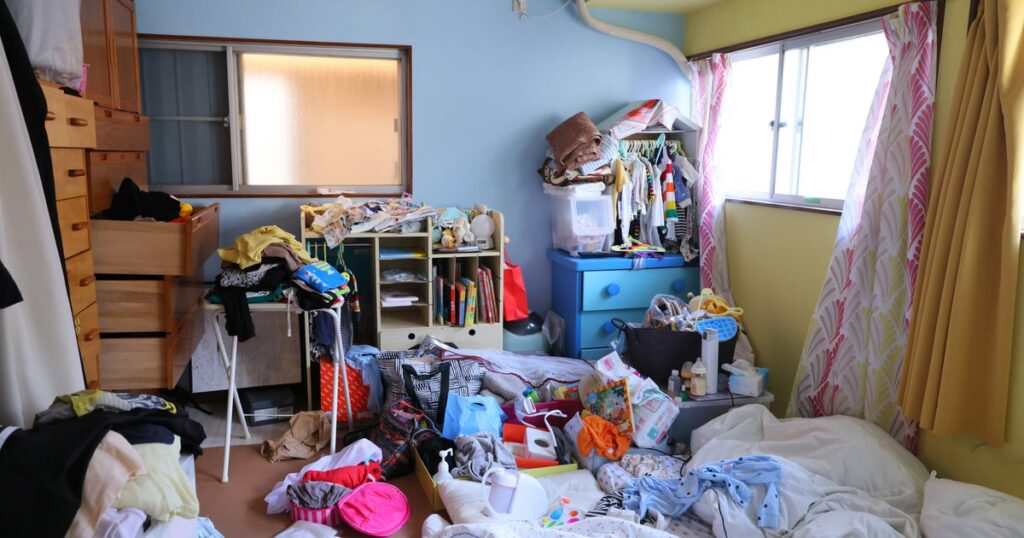We’ve all encountered a bursting closet, chaotic kitchen or sea of clutter across the living room floor at some point in our lives. In these moments, there’s an instinct to just slam the door and walk away.
“Feeling overwhelmed is normal,” Dina Smith, a professional organizer and founder of Closet Therapy with Dina, told HuffPost. “Even experienced pro organizers have their breath taken away at times.”
Indeed, overwhelm is essentially a heightened form of stress or fear.
“When your brain senses a threat — even if that ‘threat’ is an over-stuffed room — it shifts into protective mode,” said Lisa Zaslow, a professional organizer with Gotham Organizers. “The rational, problem-solving part of your brain temporarily shuts down so that you can react quickly and instinctively. Eons ago, our ancestors didn’t have time to strategize if they encountered a saber-toothed tiger.”
While we’ve all heard of the fight-or-flight response, there’s also another reaction: freeze.
“That’s what’s going on with overwhelm,” Zaslow said. “The key is to recognize what’s going on ― it’s your nervous system on high alert ― so you can calm it down and then think about how to address a mess.”
Over time, most professional organizers have developed different approaches to working through overwhelm. HuffPost asked some to share the first thing they do when they feel overwhelmed by a mess, whether with a client or in their own home.
Clear the countertops.
“The first thing I do when I encounter an overwhelming mess is clear the countertops. The reason I do this is that it makes the biggest impact in the shortest amount of time.” ― Barbara Reich, professional organizer at Life Organized
Collect any overt trash.
“The first thing I do if I feel overwhelmed by a mess is grab a garbage bag and start collecting any overt trash. This will peel off the first layer of mess, give me a boost of confidence that things are moving in the right direction, and is instantly gratifying. I call the overt trash ‘low-hanging fruit’ and always suggest people start there if they feel overwhelmed. Once you’ve done that, you can start chipping away at the rest of the mess and get organizing!” ― Tova Weinstock, professional organizer at Tidy Tova
“Build some momentum through movement by gathering the obvious trash/discarded items. As you are moving through the space, you can then begin to clear a work/staging area. This will act as a centering point for your project.” ― Smith
Choose one category to focus on.
“Personally and professionally, I never get overwhelmed by a mess, I actually get excited. The first step is to break it down by picking one category to work on. For example, if you pick paperwork, go around your home and gather all of the loose papers and take them to a clear space to sort. Try not to get distracted by other items and focus only on the category you are working on. Once finished, you can then make another selection, like clothing, and keep working your way down until the mess becomes less.” ― Julie Naylon, professional organizer at No Wire Hangers
ljubaphoto via Getty Images
Assess goals and resources.
“It is very important when beginning a project to clarify a couple of things: What are your goals for this space? If you could wave a magic wand and this project were finished, what would you see? This question is critical, because it sets priorities for moving forward. For example, if you want to turn a crowded ‘storage’ room into a usable guest room, you can come back to this fact as you review items in the room. When you struggle with letting go, ask, ‘What’s more important: keeping this item or clearing space for a guest room?’ Then ask, what resources ― time and money ― do you want to invest in this project? Is the goal to chip away at this little by little over many weeks or to go full force over a long weekend? Do you have a budget for things like junk haulers, closet companies, professional organizers, etc? Or, does this need to be a DIY project where you make the most of what you already own?” ― Seana Turner, founder of The Seana Method
Pause and take a breath.
“When I’m slammed busy and have a lot of balls in the air and look at a very crowded desk and messy living room, the first thing I do is, literally, step back [and] survey the room, take a big breath, and just pause for a few minutes. My brain needs to take it all in, and then I start ordering how I’m going to tackle each area. The pause, the taking a breath, both serve to calm my mind, providing me with some equilibrium. It’s a reset ― like clearing my mental desktop before tackling the physical one. In a nutshell, it’s to stop, look and then lean in.” ― Regina Lark, professional organizer at A Clear Path
“Clutter can feel especially overwhelming for women ― it’s been shown to raise cortisol levels more quickly than it does in men. So, when I pause to take slow, intentional breaths, it helps calm my nervous system. A little self-talk and a few deep breaths go a long way in shifting my mindset so I can deal with the mess later without spiraling.” ― Beth Penn, professional organizer at Bneato Bar
“When you’re overwhelmed, your sympathetic nervous system has taken over ― that fight-flight-freeze part of the brain. So you want to switch gears and activate the parasympathetic nervous system, the ‘rest and digest’ mode. When you’re calmer and not feeling overwhelmed, you can more easily access that prefrontal cortex part of the brain which helps with things like decision-making, organizing, attention and emotional regulation. A really simple breathing practice calms and grounds me. You can sit or stand in a relaxed way and have your eyes closed or gazing downward. Just take a really slow, deep breath through your nose, hold it for a few seconds, and then exhale slowly through the mouth.” ― Linda Samuels, professional organizer at Oh, So Organized
Break down the project into small steps or time blocks.
″‘Every journey begins with a single step’ is a phrase that guides me when I find myself confronted by a large, overwhelming mess. I face the situation head-on by breaking it down into small, manageable steps. I make sure the first step does not demand a lot of brain power on my part. Picking up obvious trash or spending 30 seconds making the bed are quick, easy wins. Then, I pick one corner or one drawer or one shelf to tackle. I focus on that and only that until it is cleared out. These small, easy first steps help me build confidence and momentum to tackle the harder items. I find inaction leads to more stress. Forcing myself to do something, even if it is not perfect, helps me work through the overwhelm. There is plenty of time for perfection. Sometimes you just need to make progress.” ― Sarah Giller Nelson, founder, Less is More Organizing Services
“Once you can see the goal, creating a plan for getting there is the next step. Taking small initial steps helps to diminish the gravity of overwhelm. Smaller time blocks give you the small wins that allow us to move forward and conquer the task at hand.” ― Smith
“Make use of small time blocks, rather than feeling like you’ve got to do it all at once. Use a timer and set it for 10, 15 or 30 minute increments. Then when it chimes, you can either reset the time and continue if you’re on a roll. Or if you’ve had enough, return later another day and continue.” ― Samuels

Andreas Coerper Mainz via Getty Images
Gather and group common items.
“I scan the space and look for the most common type of item. Grouping things together, putting like with like, jump-starts the organizing process. If it’s something easy to toss or recycle ― like shopping bags or cardboard boxes or wire hangers ― that’s even better, since we’ll immediately reduce the amount of stuff and create more space. When a client sees progress quickly, overwhelm is replaced with optimism and excitement, and they’re on their way to creating a home that makes them feel good. Once you have a strategy in place, a situation is unlikely to make you feel overwhelmed.” ― Zaslow
Establish designated working areas.
“The work at the beginning of a large project is usually the hardest because this is when there is the least free space in which to work. So, I always begin by doing some sorting and reshuffling to maximize the efficiency of the workspace. Begin by clearing a path of travel, if necessary, so you can move in and out of the space safely. Establish a space for reviewing items, which is preferably a well-lit table or waist-high surface. Decide in advance where items will be put as you make decisions. Often, this includes a place for donations, an area for trash, a container for recycling and then a space for items you plan to keep. It’s common to accumulate some belongings that can be carried around and put away in other rooms (I call this the ‘elsewhere’ pile), and then there will be things to put back into the original space upon completion. Setting up locations in advance for where things will go as you work through the sorting greatly eases the entire process, especially when a space feels overwhelming.” ― Turner
Do a mindset adjustment.
“The first thing I do is to change my internal state ― my feelings and my attitude ― so that I can gain control and alter that external state, the mess. When you’re feeling overwhelmed, your internal messages become really negative. So once you’ve taken a deep breath, try to reframe your thoughts [to] something that’s more affirming and positive. I might say something to myself like ‘my superpower is making order out of chaos’ or ‘you’ve got this, kiddo!’ Change the messages in your head, and you can switch your internal state from being overwhelmed to a place where you can actually make progress.” ― Samuels
Lower expectations.
“I immediately lower my expectations of how perfect the space ‘should’ look. I remind myself that a spotless home isn’t the top priority in that moment, and I mentally put on blinders so I can stay focused on what actually matters. When I do have the bandwidth to tackle it, I delegate with zero guilt. I’ll often toss anything that doesn’t belong in the room into the hallway, and then ask the family to help clean ― either before or after dinner, depending on how chaotic things are.” ― Penn
Answers have been edited and condensed for clarity.
Read the full article here








